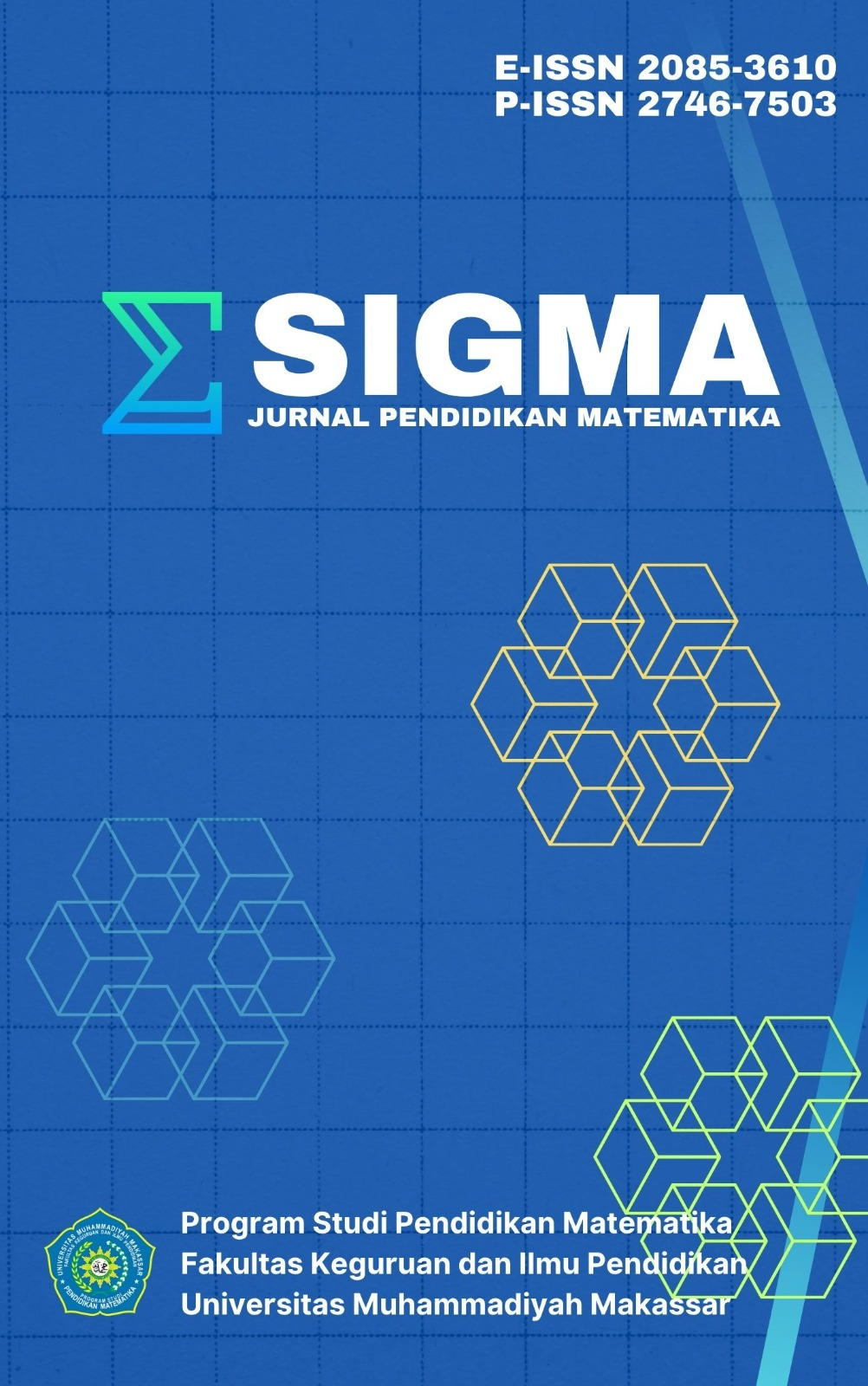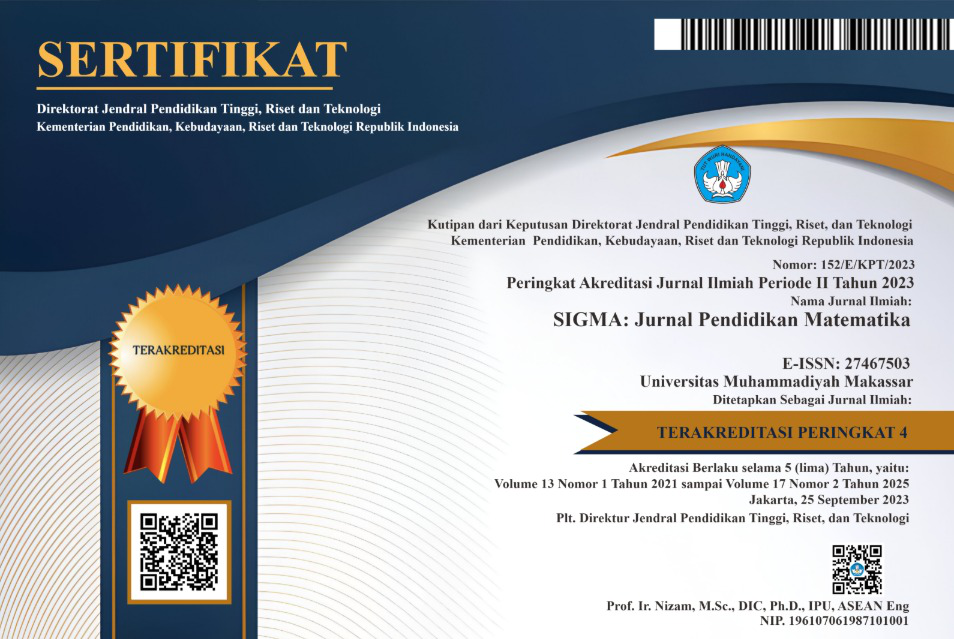SYSTEMATIC LITERATURE REVIEW: PEMBELAJARAN BERBASIS PERMAINAN DALAM PENDIDIKAN MATEMATIKA TERHADAP EFEKTIVITAS DAN STRATEGI IMPLEMENTASINYA
DOI:
https://doi.org/10.26618/sigma.v17i1.18403Keywords:
pembelajaran berbasis permainan, pendidikan matematika, efektivitas, strategi implementasi, systematic literature reviewAbstract
Penelitian ini bertujuan untuk menelaah secara sistematis efektivitas serta strategi implementasi pembelajaran berbasis permainan dalam pendidikan matematika. Latar belakang kajian ini adalah masih dominannya pembelajaran matematika yang bersifat konvensional, abstrak, dan kurang melibatkan siswa secara aktif, sehingga berdampak pada rendahnya motivasi belajar dan pemahaman konsep. Dengan pendekatan tinjauan pustaka sistematis, analisis dilakukan sebanyak dari 30 artikel hanya 14 artikel memenuhi seluruh kriteria dari berbagai sumber. Hasil kajian menunjukkan bahwa integrasi elemen permainan dalam pembelajaran matematika secara konsisten memberikan dampak positif terhadap motivasi, keterlibatan emosional dan kognitif siswa, serta peningkatan pemahaman konsep dan kemampuan pemecahan masalah. Meskipun demikian, penerapannya menghadapi berbagai tantangan, seperti keterbatasan kompetensi guru, kurangnya media dan teknologi pendukung, serta belum optimalnya dukungan dari sisi kebijakan pendidikan. Oleh karena itu, strategi implementasi yang mencakup pelatihan guru, pengembangan media pembelajaran, serta integrasi ke dalam kurikulum sangat diperlukan. Kajian ini menyimpulkan bahwa pembelajaran berbasis permainan layak diterapkan untuk menciptakan pembelajaran matematika yang lebih kontekstual, menyenangkan, dan bermakna bagi siswa.References
Amalina, I. K., & Vidákovich, T. (2023). Cognitive and socioeconomic factors that influence the mathematical problem-solving skills of students. Heliyon, 9(9). https://doi.org/10.1016/j.heliyon.2023.e19539
Andriani, F., & Wahyudi, W. (2023). Media permainan ular tangga berbasis misi untuk meningkatkan kemampuan pemecahan masalah matematika siswa SD. Jurnal Educatio FKIP UNMA, 9(4), 1869-1875. https://doi.org/10.31949/educatio.v9i4.5743
Angwarmasse, P., & Wahyudi, W. (2021). Pengembangan game edukasi labirin matematika untuk meningkatkan kemampuan pemecahan masalah siswa kelas VI sekolah dasar. Jurnal EDUCATIO: Jurnal Pendidikan Indonesia, 7(1), 46-52. https://doi.org/10.29210/120212953
Bayeck, R. Y. (2020). Examining board gameplay and learning: A multidisciplinary review of recent research. Simulation & Gaming, 51(4), 411-431. https://doi.org/10.1177/1046878119901286
Booth, A., Sutton, A., & Papaioannou, D. (2021). Systematic approaches to a successful literature review (3rd ed.). SAGE Publications.
Christidamayani, A. P., & Kristanto, Y. D. (2020). The effects of problem posing learning model on students' learning achievement and motivation. arXiv preprint arXiv:2002.04447. https://doi.org/10.48550/arXiv.2002.04447
Dai, C. P., Ke, F., Pan, Y., & Liu, Y. (2023). Exploring students’ learning support use in digital game-based math learning: A mixed-methods approach using machine learning and multi-cases study. Computers & Education, 194, 104698. https://doi.org/10.1016/j.compedu.2022.104698
Fathurrohman, M., Nindiasari, H., & Rahayu, I. (2022). A conventional and digital mathematical board game design and development for use by students in learning arithmetic. Journal on Mathematics Education, 13(4), 631-660. https://doi.org/10.22342/jme.v13i4.pp631-660
Fathurrohman, M., Pamungkas, A. S., Satyanegara, D., Putra, D. D., Lesmana, R., Jannah, F. M., ... & Gemilang, A. P. (2023). Produk Intelektual Kampus Board Game Labirin Matematika: Ragam Model Dan Potensi Penggunanya. Jurnal Penelitian dan Pembelajaran Matematika, 16(2), 303-311. https://dx.doi.org/10.30870/jppm.v16i2.21665
Godoy Jr, C. H. (2021). Developing an Augmented Reality-Based Game as a Supplementary tool for SHS-STEM Precalculus to Avoid Math Anxiety. arXiv preprint arXiv:2109.09336. https://doi.org/10.48550/arXiv.2109.09336
Hui, H. B., & Mahmud, M. S. (2023). Influence of game-based learning in mathematics education on the students' cognitive and affective domain: A systematic review. Frontiers in psychology, 14, 1105806. https://doi.org/10.3389/fpsyg.2023.1105806
Kuo, H. C., Weng, T. L., Chang, C. C., & Chang, C. Y. (2023). Designing our own board games in the playful space: Improving high school student’s citizenship competencies and creativity through game-based learning. Sustainability, 15(4), 2968. https://doi.org/10.3390/su15042968
Lozano, A. S., Canlas, R. J. B., Coronel, K. M., Canlas, J. M., Duya, J. G., Macapagal, R. C., ... & Miranda, J. P. P. (2023). A game-based learning application to help learners to practice mathematical patterns and structures. arXiv preprint arXiv:2306.13685. https://doi.org/10.48550/arXiv.2306.13685
Maitem, J., Cabauatan, R. J., Rabago, L., & Tanguilig III, B. (2012). Math world: A game-based 3d virtual learning environment (3d vle) for second graders. arXiv preprint arXiv:1203.1964. https://doi.org/10.48550/arXiv.1203.1964
Novak, E., & Soyturk, I. (2021). Effects of action video game play on arithmetic performance in adults. Perception, 50(1), 52-68. https://doi.org/10.1177/0301006620984405
Qu, X. (2022). Model Construction of Game-Based Teaching Applying in Class. Open Access Library Journal, 9(11), 1-6. https://doi.org/10.4236/oalib.1109487
Page, M. J., McKenzie, J. E., Bossuyt, P. M., Boutron, I., Hoffmann, T. C., Mulrow, C. D., ... & Moher, D. (2021). The PRISMA 2020 statement: An updated guideline for reporting systematic reviews. BMJ, 372, n71. https://doi.org/10.1136/bmj.n71
Putra, D. D., Pamungkas, A. S., Nindiasari, H., Fathurrohman, M., & Porter, A. (2024). Impact the Labirin: The Board Game on the Student's Numeracy Ability. Journal of Research and Advances in Mathematics Education, 9(1), 32-42. https://doi.org/10.23917/jramathedu.v9i1.3299
Radityastuti, E. Y., Lukman, H. S., & Agustiani, N. (2023). Implementasi Digital Game-Based Learning Untuk Meningkatkan Kemampuan Berpikir Kritis Dan Pemecahan Masalah Matematis Siswa SMP. AXIOM: Jurnal Pendidikan dan Matematika, 12 (1), 96. http://dx.doi.org/10.30821/axiom.v12i1.16047
Tranfield, D., Denyer, D., & Smart, P. (2020). Towards a methodology for developing evidence-informed management knowledge by means of systematic review. British Journal of Management, 14(3), 207-222. https://doi.org/10.1111/1467-8551.00375
Vatutin, A., Moskalenko, M., Skryabin, M., Svintsov, M., & Trifanov, A. (2021). Computational psychometric approach for assessing mathematical problem-solving skills. Procedia Computer Science, 193, 250-255. https://doi.org/10.1016/j.procs.2021.10.025
Vita-Barrull, N., Estrada-Plana, V., March-Llanes, J., Guzmán, N., Fernández-Muñoz, C., Ayesa, R., & Moya-Higueras, J. (2023). Board game-based intervention to improve executive functions and academic skills in rural schools: A randomized controlled trial. Trends in Neuroscience and Education, 33, 100216. https://doi.org/10.1016/j.tine.2023.100216
Downloads
Published
Issue
Section
License
Copyright (c) 2025 SIGMA: JURNAL PENDIDIKAN MATEMATIKA

This work is licensed under a Creative Commons Attribution-ShareAlike 4.0 International License.
With the receipt of the article by the SIGMA: Jurnal Pendidikan Matematika Editorial Board and the decision to be published, then the copyright regarding the article will be diverted to SIGMA: Jurnal Pendidikan Matematika.
Universitas Muhammadiyah Makassar as the publisher of SIGMA: Jurnal Pendidikan Matematika hold the copyright regarding all the published articles in this journal.Universitas Muhammadiyah Makassar has the right to multiply and distribute the article and every author is not allowed to publish the same article that was published in this journal.
The manuscript authentic and copyright statement submission can be downloaded ON THIS FORM.






